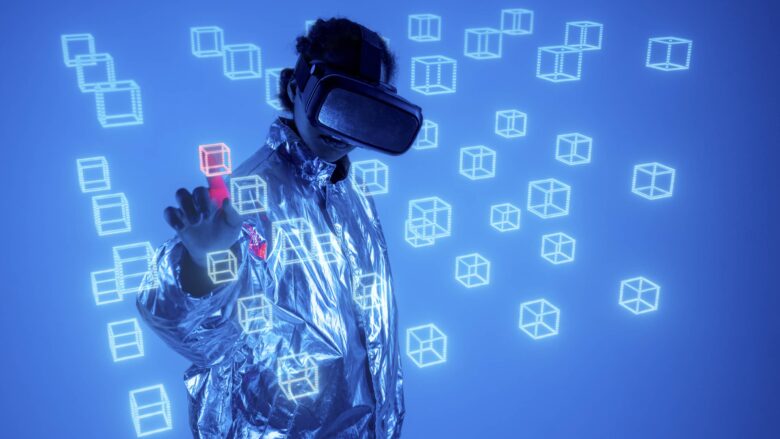People, businesses, and manufacturers can all collaborate, interact, and try new things in the metaverse, a virtual world that is part of the rapidly evolving digital world. As technology evolves, the lines between the real and digital worlds are increasingly blurred. This process opens up new opportunities for virtual real estate, digital marketplaces, and immersive experiences. These opportunities must address ethical and technical difficulties. Building cities in the metaverse offers opportunities in entertainment, education, and real estate, but it also brings challenges that must be solved to grow the urbanism industry. Entrepreneurs, engineers, and those interested in the metaverse must understand how it works so they can survive in this ever-changing world.
The Metaverse: The New Digital Frontier
In the metaverse, people typically communicate with each other through avatars and connect to the digital world in real time. The metaverse is an ever-changing environment for business, social interaction, and new ideas. It is powered by VR, AR, blockchain, and AI. Microsoft, Decentraland, and Meta (formerly Facebook) have all invested heavily in building the metaverse, which could change the way we work, play, and communicate with each other. Builders and thinkers can create virtual worlds, digital assets, and new ways of doing business in the metaverse. This new field of technology is still young, but it’s changing rapidly and is worth exploring and investing in.
Virtual Land Sales and Building Opportunities:
In the metaverse, it’s possible to buy, sell, and build digital land through virtual real estate. Individuals and businesses can use cryptocurrencies or NFTs to purchase virtual land on Decentraland, The Sandbox, and Cryptovoxels. These virtual places can be stores, concert halls, offices, or schools. Both Nike and Sotheby’s are using their online stores in creative ways to generate interest. Architects and designers can try out new buildings in virtual reality without having to worry about sourcing the right materials or adhering to building codes in their field. Early adopters are taking advantage of the rising value of virtual land and the events, rentals, and advertising that can take place there.
How the Digital Economy Is Changing and NFTs:
The metaverse is the foundation on which the digital economy operates, powered by blockchain and NFTs. These marketplaces allow people to buy, sell, and trade virtual clothing, accessories, art, and collectibles. People who create items can use NFTs as proof of ownership, bypassing the middleman and selling their creations directly to customers. Businesses can increase their revenue by providing limited-edition digital merchandise or unique events. Artists can host virtual performances, and fans can buy NFT tickets or merchandise. Brands and digital artists can also collaborate to create virtual things. Thanks to cryptocurrencies, these economies are becoming increasingly interconnected, making the metaverse a place where people can start businesses and be creative.
Technical and Interoperability Issues:
Despite this promise, the metaverse still faces several technical issues, including its inability to interoperate with other systems. Because many virtual platforms are isolated environments, it is difficult to move assets and identities between them. To facilitate the easy movement of avatars, money, and objects between virtual worlds, the metaverse must interoperate with other virtual worlds. For the metaverse to work, you also need rapid internet, a powerful computer, and a VR/AR device. Many people still do not have access to these technologies, making them harder to use at scale. Technology companies need to collaborate, standardize approaches, and roll out new hardware and software to address these issues.
Ethics, Privacy, and Security:
As the metaverse grows, so do concerns about privacy, security, and right and wrong. Virtual worlds with VR devices collect a lot of information about users, including biometric information. I worry about who owns this information and how we can keep it safe. In the digital world, there is the potential for hacking and name theft. Therefore, strong security is necessary. The metaverse needs to think about issues like digital addiction and cyberbullying from an ethical perspective. It also needs to look at how energy-intensive blockchain systems impact the world. Developers, politicians, and users all need to work together to ensure that the metaverse is safe and welcoming and can grow sustainably for everyone.
AI and Machines in the Metaverse:
Artificial intelligence will shape the metaverse, from models that resemble real people to virtual services that can run autonomously. Chatbots and AI-powered virtual assistants can enhance the user experience by helping users in real time and making more relevant suggestions. Generative AI can change settings, characters, and music over time, reducing the work required to produce content. There are risks associated with AI, such as deepfakes and biased programming. To maintain the authenticity and trustworthiness of the metaverse, a balance must be struck between automation and human oversight. AI applications will continue to expand into the metaverse, bringing opportunities and challenges for architects and users.
How will People Communicate in the Virtual World in the Future?
The metaverse allows people to connect across borders, changing the way people interact with each other. More and more people are using virtual meetings, both for business meetings and informal get-togethers. Such usage adds a dimension that video chat doesn’t have. Changeable avatars on VRChat and Horizon Worlds help people be creative and express themselves. When you build strong relationships online, you can feel lonely, and your in-person interactions can diminish. Only by encouraging authentic relationships and limiting these bad things can the metaverse succeed in the long run. In the future, people can connect in real life and online.
Creators and Commercial Monetization Strategies:
Metaverse monetization offers new ways for businesses and creators to make money. Virtual concerts and product launches can earn money by selling tickets, recruiting sponsors, and giving away special materials. Virtual landlords can rent out homes for commercial purposes, and digital fashion designers can create wearable NFTs. Subscription models and membership tiers can support metaverse platforms and content creators. To successfully earn money in the metaverse, it’s essential to comprehend its dynamics, including cryptocurrency volatility and community engagement. In the digital economy, those who are creative and willing to change will succeed.
Conclusion:
In the metaverse, people can learn about digital marketplaces, immersive experiences, virtual real estate, and new ways to connect with others. But technical challenges, privacy concerns, and ethical questions have slowed growth. To maximize the benefits and minimize the risks of the metaverse, technologists, governments, and communities must work together. The metaverse presents a terrifying yet exciting future of life in the digital world. Invest money, make something, or just look around. If you stay informed and engaged, you can create a metaverse that is creative, inclusive, and sustainable.
FAQs:
1. What is the metaverse?
People can be part of the metaverse in real time through virtual images and interactive technologies like VR and AR.
2. How do you buy real estate in the metaverse?
On Decentraland or The Sandbox, you can use cryptocurrencies or non-fungible tokens to purchase virtual land that is registered on the blockchain.
3. What are NFTs, and how are they used in the metaverse?
Non-fungible tokens (NFTs) enable transactions and trading in the metaverse. They demonstrate ownership of things like virtual land, artwork, and clothing.
4. What types of businesses can use the metaverse?
The metaverse can enable interactive experiences, virtual teamwork, and new business models in real estate, entertainment, education, healthcare, and remote work.
5. What is the biggest challenge facing the Metaverse?
There are issues with platform interoperability, privacy and security risks, ethics, and new hardware and systems. These issues include platform interoperability, privacy and security risks, ethics, and advanced hardware and infrastructure.





Comments
https://vitz.ru/forums/index.php?autocom=gallery&req=si&img=4816
http://wish-club.ru/forums/index.php?autocom=gallery&req=si&img=5330
https://honda-fit.ru/forums/index.php?autocom=gallery&req=si&img=7282
https://vitz.ru/forums/index.php?autocom=gallery&req=si&img=5054
https://mazda-demio.ru/forums/index.php?autocom=gallery&req=si&img=6518
https://vitz.ru/forums/index.php?autocom=gallery&req=si&img=4984
https://vitz.ru/forums/index.php?autocom=gallery&req=si&img=5006
http://terios2.ru/forums/index.php?autocom=gallery&req=si&img=4762
https://honda-fit.ru/forums/index.php?autocom=gallery&req=si&img=7193
http://terios2.ru/forums/index.php?autocom=gallery&req=si&img=4707
https://hrv-club.ru/forums/index.php?autocom=gallery&req=si&img=7056
https://hrv-club.ru/forums/index.php?autocom=gallery&req=si&img=7063
https://honda-fit.ru/forums/index.php?autocom=gallery&req=si&img=7102
https://hrv-club.ru/forums/index.php?autocom=gallery&req=si&img=6971
http://passo.su/forums/index.php?autocom=gallery&req=si&img=4273